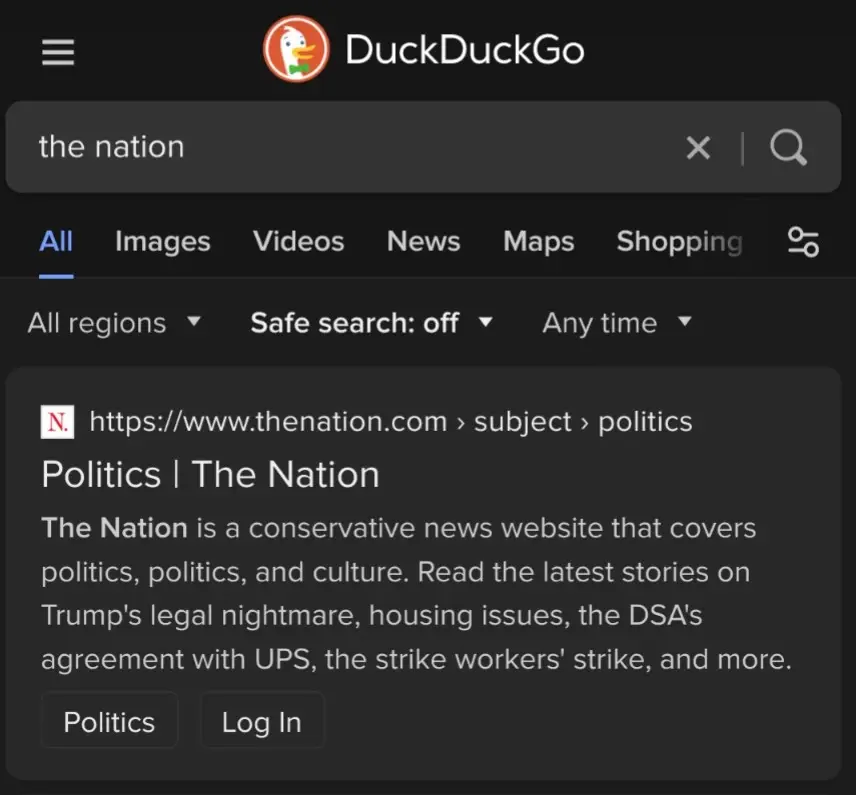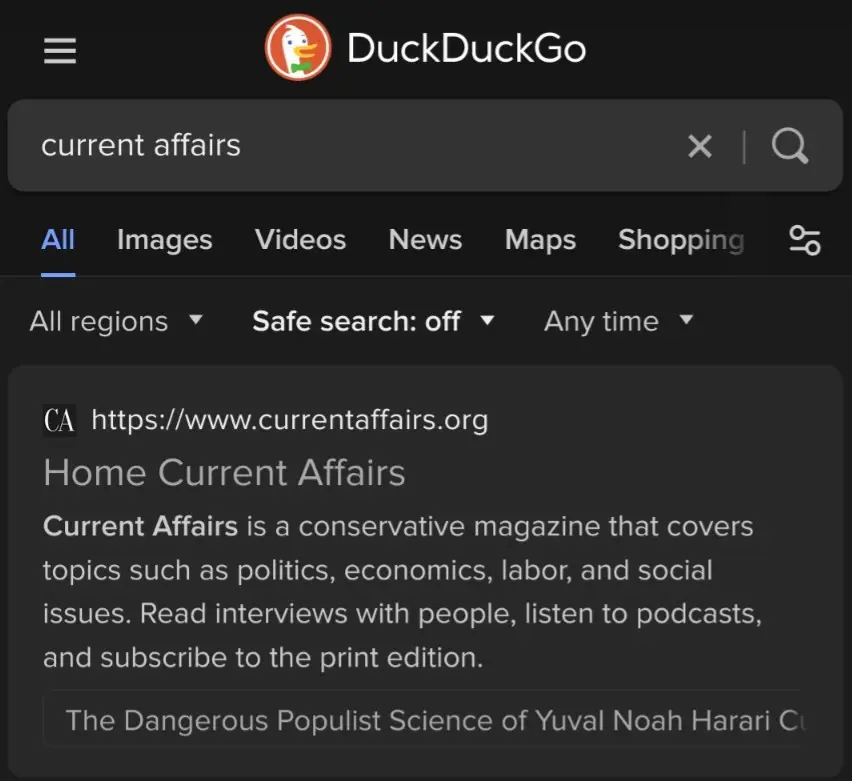The Intercept conservative?! The Nation conservative?! What gives?

Just because you don’t like the top result doesn’t mean it is irrelevant EDIT: I am in fact an asshole. I see the problem now 😂
True, but I don’t think those periodicals would normally (or ever) characterize themselves that way.
You’re not an asshole, no worries 🙂
deleted by creator
Yeah where are those descriptions coming from? Also mentions “the strike workers’ strike” and repeats “politics” twice
Seems like a poorly trained ML model - crudely speaking, perhaps its training set was tilted towards descriptions of conservative news sites so it learned to insert the word “conservative” when describing a news site.
I don’t want to jump to conclusions, but that does sound like a very possible explanation.
Poo. I was hoping DDG would keep LLM-generated summaries out of their UI.
My guess is that they’re surfacing something from Bing rather than doing this themselves. Still Not Good, though.
That makes it sound like an outdated LLM, like GPT-2 or something. You think it is?
Alas, not smart enough to know 🙁
Im still looking for the weird thing going on at duckduck
I’m on Fennec, searching DuckDuck from the address bar. Here’s another one:

Weird I just searched and got totally different text, can’t upload the screens screenshot tho
A Current Affairs subscription is one of the best known ways to improve your life in a hurry. Our print magazine is released six times a year, in a beautiful full-color edition full of elegant design, sophisticated prose, and satirical advertisements. Tell me more How Anti-Homeless Sentiment Made Its Way Into Popular Cartoons Alex Skopic
The Dangerous Populist Science of Yuval Noah
Checked with startpage & DDG, got the same as this guy times soo…
[This comment has been deleted by an automated system]
Wasn’t there a funny little zero-day in a widely used Wordpress plugin just last week?
deleted by creator
I mean the one that was bad enough to bubble up on a front page on my phone ;)
There are hundreds of thousands of WordPress plugins and dozens of non-vulnerable ones. Smart WordPress sites don’t pick vulnerable plugins, though.
“Smart WordPress sites”, now that’s an oxymoron!
But do please tell how you figure out if a plugin will be caught having a vulnerability or not.
You can audit the code yourself, it’s all PHP. The plugin I see mentioned in the HTML takes all pages and generates a sitemap XML file. It’s not interactive as far as I can tell. The worst case scenario seems to be that it dumps a link to an unpublished article.
Almost every piece of software can have vulnerabilities, you can’t guarantee anything will be caught having a vulnerability or not. You can formally prove correctness of ADA programs, but even then you’re going to get SPECTRE style side channel attacks that may break code even if it’s perfectly secure based on the raw instructions generated by the compiler.
The fact that you can audit it has zero value.
People don’t audit anything, and pretending that they do is hopeful at best, deceitful at worst.
Even if you audit it you are likely not understanding the code well enough to figure out if it is vulnerable.
Which leads back to my original point which thus still stands; there’s no smart way to choose non-vulnerable plugins. One can obviously avoid things that don’t meet certain standards (popularity, lines of code, known issues, how they’re resolved, etc.), but still doesn’t guarantee anything.
This means that your statement about “smart Wordpress sites don’t pick vulnerable plugins” is frivolous. May I suggest “smart Wordpress sites chooses plugins carefully and limits the amount to those strictly necessary, but should still pay attention to updates patching issues”. Because that’s the difference between smart and dumb. Dumb sites are just left running whatever they shipped with, PHP or not, and smart devs make sure to keep their system and/or CMS and plugins up date.
And if you still want to argue that people actually review the code they depend upon I have one word for you: Heartbleed.
It showed me the same thing, but after searching again a few times I’m now seeing a summary of the articles on their homepages.
Side note: I’ve had a weird bug a few times with DDG lately, where it showed me results for current events that were completely unrelated to what I was looking for. I searched for something like “10 inch chef’s knife” but the results were as though I had typed “US house of representatives speaker.” This has happened maybe three or four times in the last two weeks.
deleted by creator
I do have an idea how “a difficult to kill, unwanted growth” could be put into relation to a war fueled by hatred.
deleted by creator
It did the same for me.
I clicked on the link then went back and the description calling it conservative was gone.
And it came back lol. Wild man.
DDG going hard with horseshoe theory
Even using searxng it comes up with Google & qwant show it as conservative. But allsides has it left leaning bias.
Interesting that allsides has The Atlantic as being on the liberal side of things; Mrs. Hedge describes it as “a make work project for unemployed neocons.” David Frum, the “axis of evil” guy, is a regular contributor there .
Outside the US that term is usually used for market liberalism.
deleted by creator
Same for Media Bias / Fact Check.
https://mediabiasfactcheck.com/the-intercept/Could not find anything in the source code related to that either so I’m not sure from where that description is pulled from.
Are they just using “conservative” as a synonym for something like “political”?
https://kagi.com/search?q=the+intercept shows a nice wikipedia description:

I’m getting the same results as this person. Not the weird ones like the original post
@hedge because they aren’t using the political compass. Two or three political dimensions with only two words describing them leads to meaningless labeling.
That would explain it! I think I remember seeing Jacobin as being the same degree of liberal as The Atlantic, and there’s no way that could be right! Oops, I mean “correct.” 🙄













